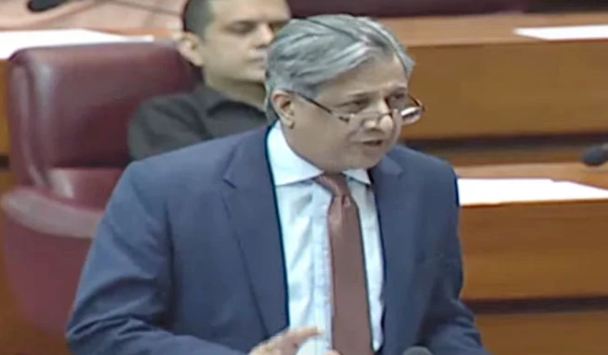ISLAMABAD: Amid strong protest from the Pakistan Tehreek-e-Insaf (PTI), the federal government Monday got the Supreme Court (Practice and Procedure) Bill, 2023, passed in the joint session of parliament after President Arif Alvi returned the bill seeking to curtail the chief justice’s suo motu powers last week.
Law Minister Law Minister Azam Nazeer Tarar presented the SC bill in the joint sitting of the house held with National Assembly Speaker Raja Pervaiz Ashraf in the chair.
The president had returned the bill for reconsideration to parliament as per the provisions of the Article 75 of the Constitution, stating that the bill prima-facie travels beyond the competence of parliament and can be assailed as colourable legislation. The bill was aimed at curtailing the powers of the chief justice of Pakistan (CJP) — including the suo motu and the formation of benches.
During the much-anticipated sitting, the house approved an amendment to the SC bill, under which the judges committee meeting will be convened to devise rules and regulations regarding the suo motu matter. The amendment was proposed by PML-N lawmaker Shaza Fatima Khawaja.
As per the amendment, the chief justice of Pakistan or any other member of the committee can call the meeting until the rules and regulations are finalised.
Now the bill will be presented before the president once again for his assent. If the head of the state does not give his approval within 10 days, it would be deemed to have been given.
‘Voices from within SC’
Addressing the joint session, the law minister said that voices against the chief justice’s suo motu powers were arising from within the top court.
It is pertinent to mention here that two judges of the apex court on March 27 raised questions over the powers of the CJP, saying the SC “cannot be dependent on the solitary decision of one man, the Chief Justice”.
In a 27-page detailed note for the apex court’s March 1 verdict in Punjab and Khyber Pakhtunkhwa suo motu, Justice Syed Mansoor Ali Shah and Justice Jamal Khan Mandokhail pointed out that it is important “to revisit the power of ‘one-man show’ enjoyed by the office of the Chief Justice of Pakistan [Umar Ata Bandial]”.
In his 25 page-long note, Justice Athar Minallah said, “The process of constitution of benches and allocation of cases must be transparent, fair and impartial.”
The law minister read out the message of the president who returned the bill for reconsideration. He said that bill was discussed in detail in the National Assembly and it was also approved by the Senate.
The minister responded to the objections of the bill and said the “President used inappropriate words while returning this bill and used a biased approach”. He said that Dr Alvi should think “as the President rather than a political worker”.
The federal minister said it was the demand of the bar associations and councils to introduce the bill and they had supported the bill. This bill, he said, was an old demand of the bar council which said that the indiscriminate use of 184(3) should be stopped.
The bill
The passed bill – the Supreme Court (Practice and Procedure) Bill, 2023 – aimes at giving the power of taking suo motu notice to a three-member committee comprising senior judges including Chief Justice. It also aimes to have transparent proceedings in the apex court and includes the right to appeal.
Regarding the constitution of benches, the bill states that every cause, matter or appeal before the apex court would be heard and disposed of by a bench constituted by a committee comprising the CJP and the two senior-most judges. It added that the decisions of the committee would be taken by a majority.
Regarding exercising the apex court’s original jurisdiction, the bill said that any matter invoking the use of Article 184(3) would first be placed before the committee.
The bill says that if the committee is of the view that a question of public importance with reference to the enforcement of any of the fundamental rights conferred by Chapter I of Part II of the Constitution is involved, it shall constitute a bench comprising not less than three judges of the SC of Pakistan which may also include the members of the committee, for adjudication of the matter.
On matters where the interpretation of the Constitution is required, the bill said the committee would compose a bench comprising no less than five apex court judges for the task.
About appeals for any verdict by an apex court bench that exercised Article 184(3)‘s jurisdiction, the bill said that the appeal will lie within 30 days of the bench’s order to a larger SC bench. It added that the appeal would be fixed for hearing within a period not exceeding 14 days.
It added that this right of appeal would also extend retrospectively to those aggrieved persons against whom an order was made under Article 184(3) prior to the commencement of the SC (Practice and Procedure), Bill 2023, on the condition that the appeal was filed within 30 days of the act’s commencement.
The bill additionally said that a party would have the right to appoint its counsel of choice for filing a review application under Article 188 of the Constitution.
Furthermore, it states that an application pleading urgency or seeking interim relief, filed in a cause, appeal or matter, shall be fixed for hearing within 14 days from the date of its filing.
The bill said that its provisions would have effect notwithstanding anything contained in any other law, rules, or regulations for the time being in force or judgement of any court, including the Supreme Court and high courts.

















